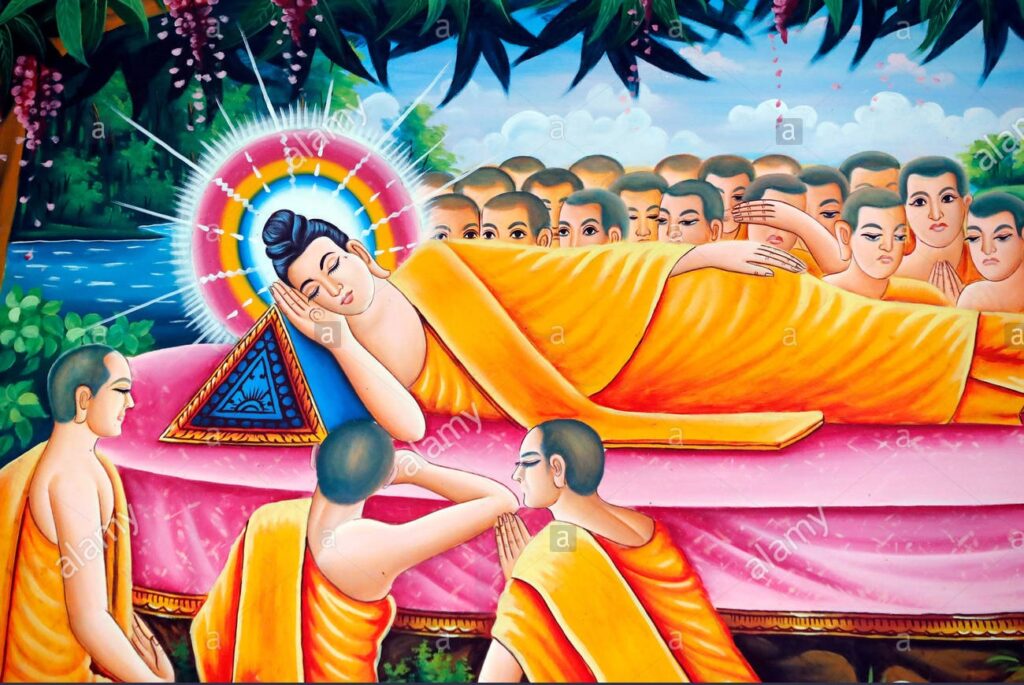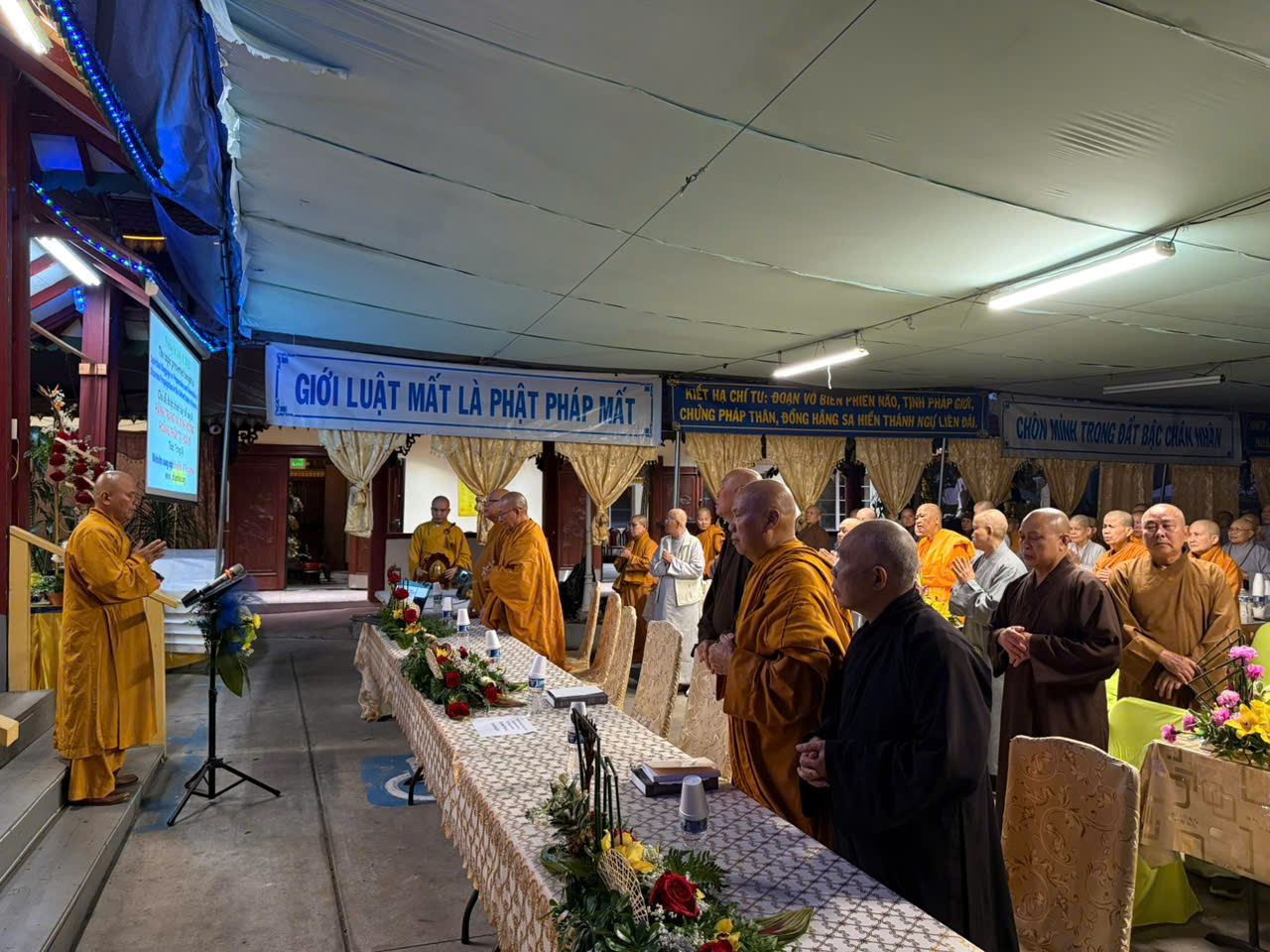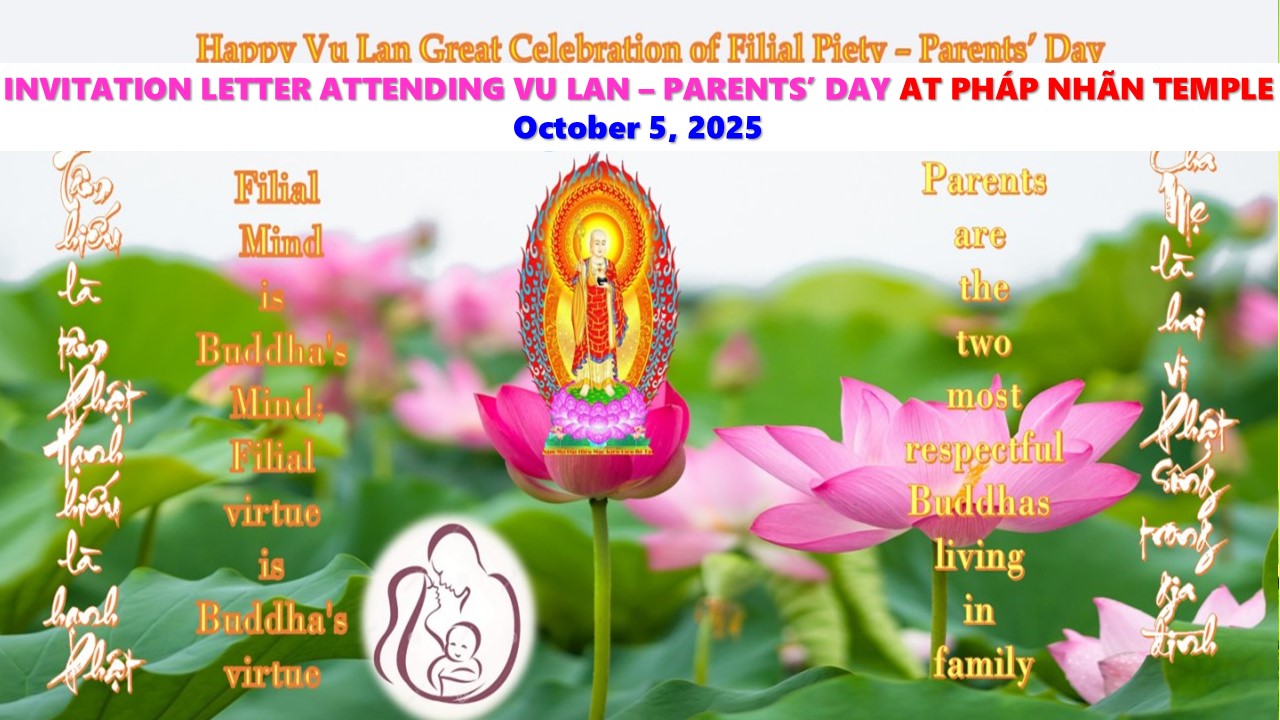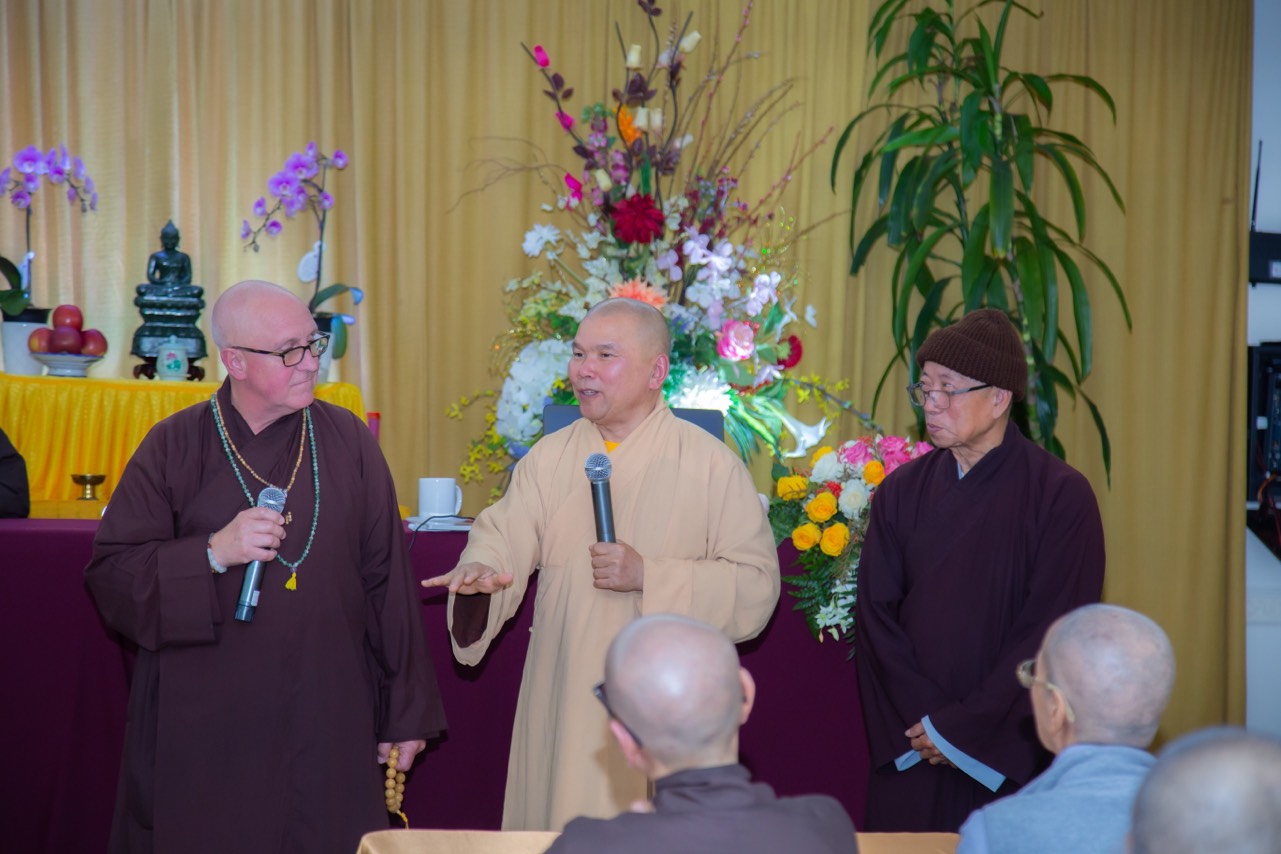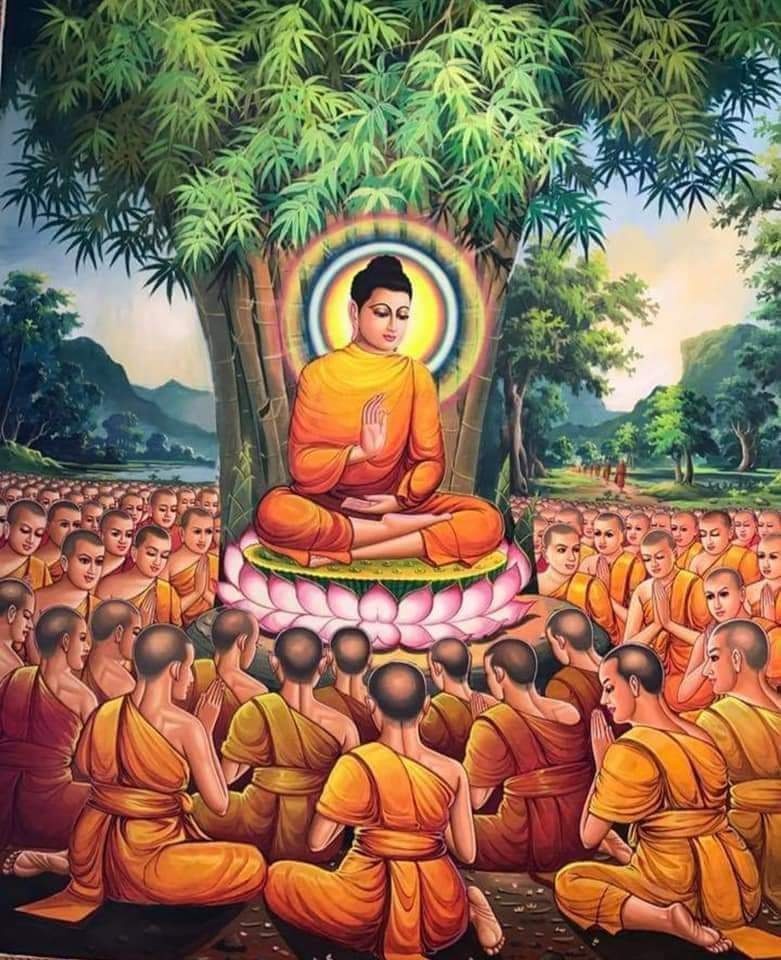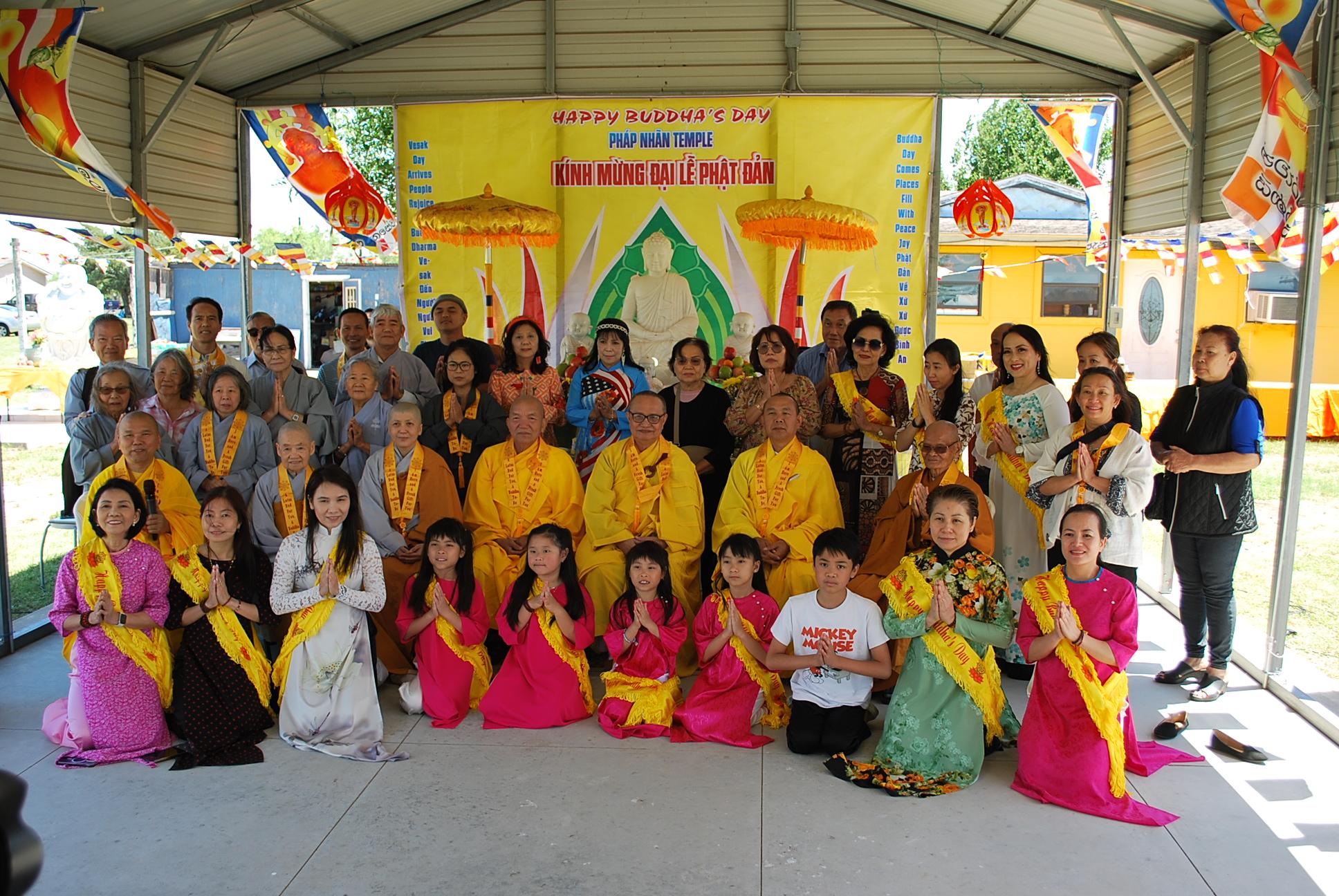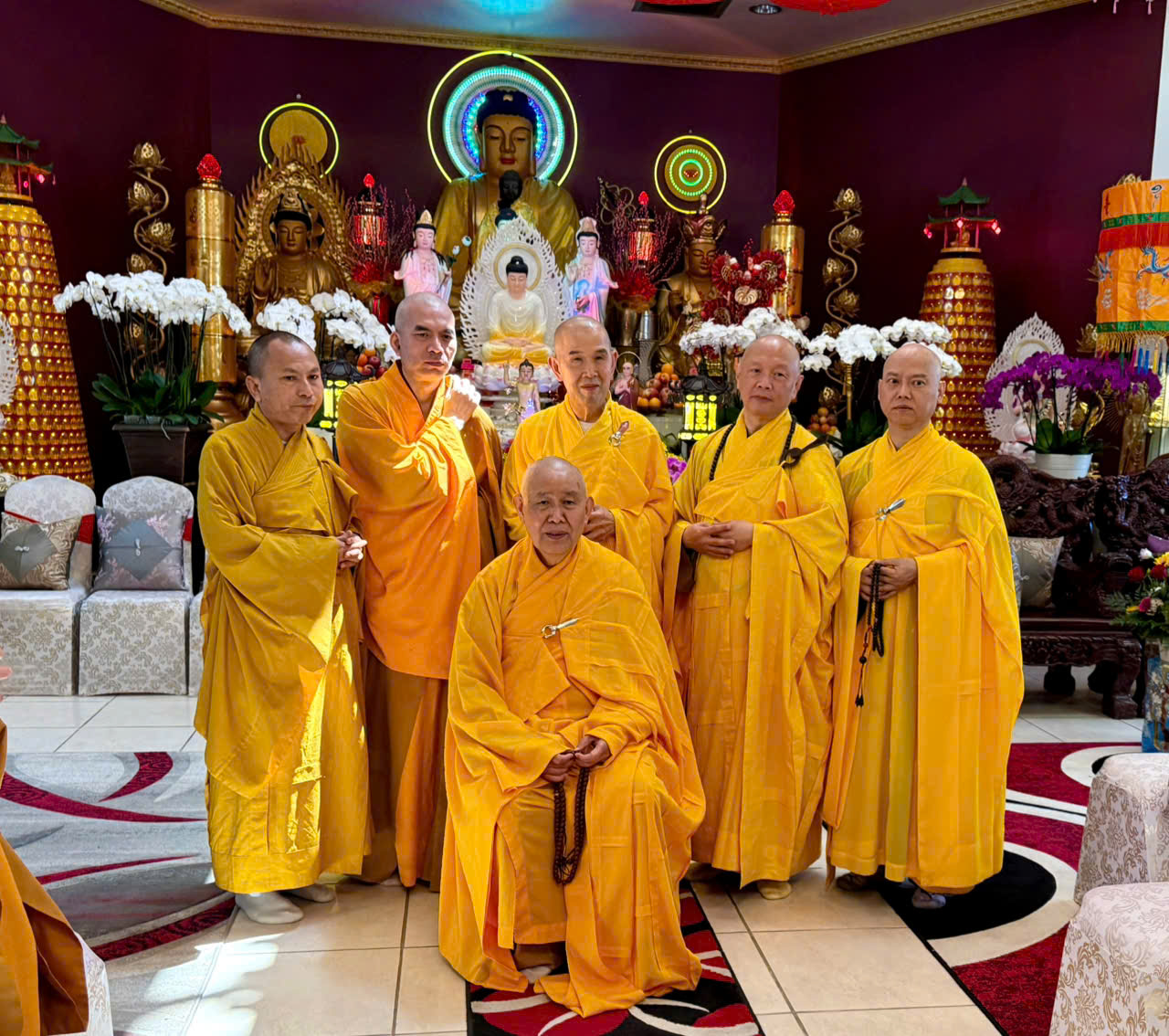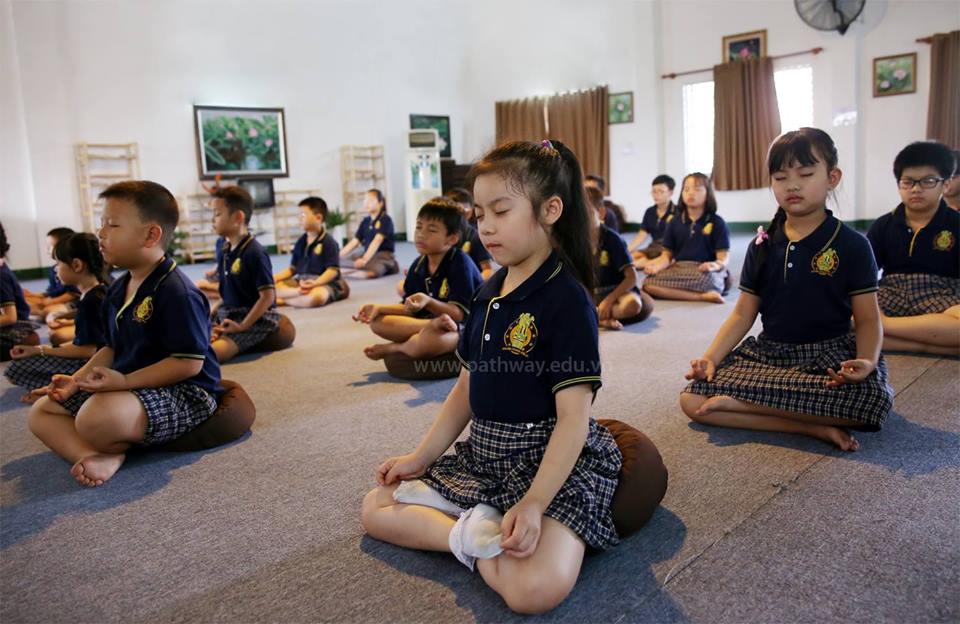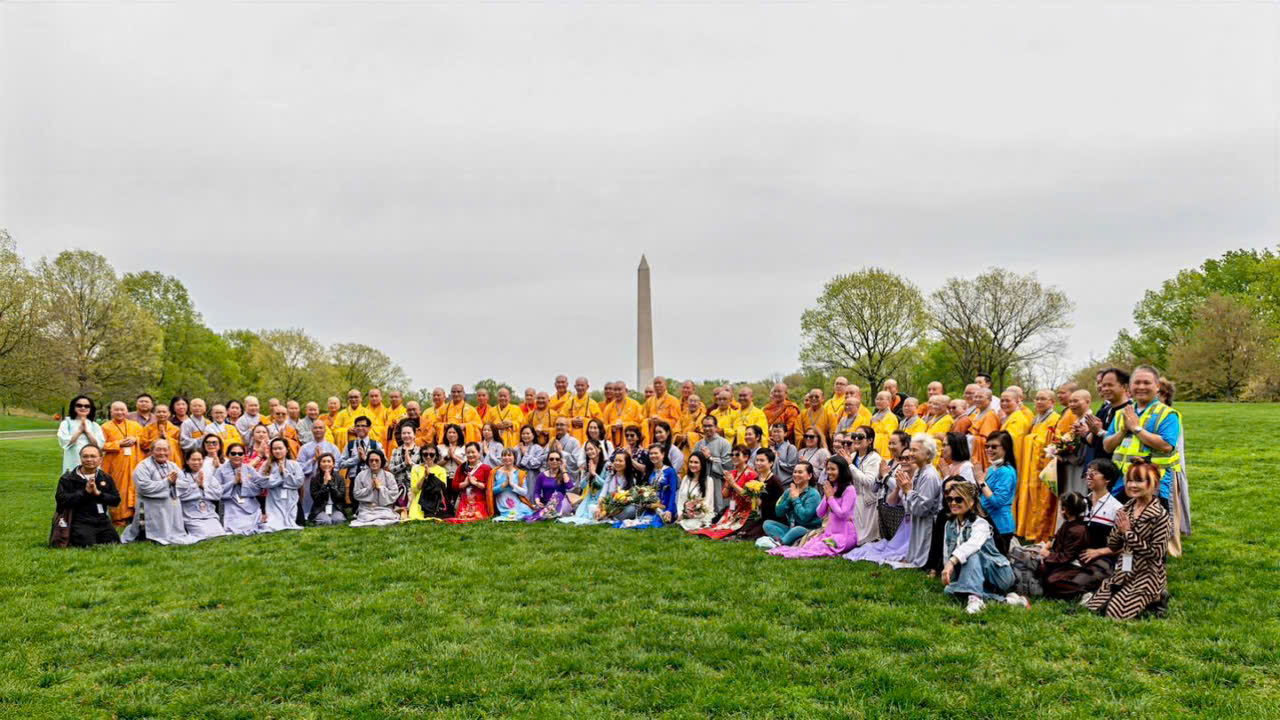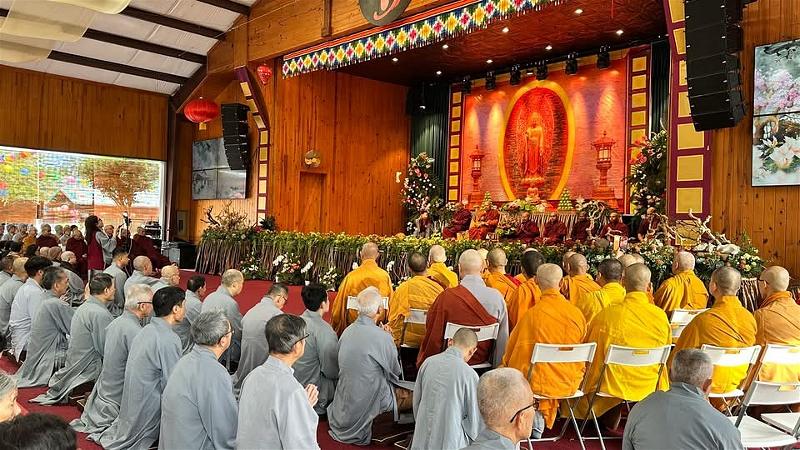
Rite of Chanting the Bequeathed Teaching Sutra
Namo Tassa Bhagavato Arahato Samma SamBuddhassa
(3 times)
Respectfully pay homage to the Buddha: the World-Honored One, the Worthy One, the Exalted One, the Fully Awakened and Enlightened One. (Bell)
Incense Offering
As wonderful as the lotus flower,
as bright as the northern star,
let us come back and take refuge in
the Teacher gods and human beings.
The precious lotus blossoms on the enlightened pedestal
the halo shines in all directions.
Wisdom goes beyond the dharma realms,
Loving-kindness and compassion permeate all over the mountains and rivers.
I have just seen the Buddha’s perfect countenance,
My whole heart is sincere to make offerings to the Buddha,
I forward it to praise the Triple Gem
Diligence in the Dharma path is well cultivated.
As the incense is lit,
sandalwood perfumes the air,
making an auspicious rainbow cloud.
I, disciple of the Buddha, with all my respect
offer my heart to the Buddhas of the Ten Directions.
May we practice the precepts seriously at all times
May we practice concentration diligently,
May we offer the precious fruit of insight as our offering of incense of the heart.
We would like to respectfully offer the incense of ethics, meditation, wisdom, deliverance, and that of deliverance with right understanding to the Buddha, Bodhisattvas, virtuous and noble Sangha, Dharma guardians, good gods, knowing and understanding our wholehearted minds. (Bell)
Touching the earth in deep gratitude to the Triple Gem
Praising the Buddha Jewel
The Buddha Jewel shines infinitely.
He has realized perfect understanding for countless lifetimes.
The beauty and stability of a Buddha sitting
can be in the mountains and rivers.
How splendid the Vulture Peak is!
How beautiful the light that shines forth from the Buddha’s third eye,
Illuminate the six dark paths.
The Nagapushpa[1] Assembly will be our next appointment
for the continuation of the true teachings of practices.
We take refuge in the Buddha ever-present.
We, disciples of Gautama Buddha, wholeheartedly pay homage to the Buddha forever present in the three lifetimes and ten directions. (Bell, one prostration)
Praising the Dharma Jewel
The Dharma Jewel is infinitely lovely.
It is the precious words spoken by the Buddha himself,
like fragrant flowers floating down from the heavens.
The wonderful Dharma is clear to see.
It is recorded luminously in the three transparent baskets
handed down from generation to generation in the Ten Directions
so that today we can see our way.
We vow to study it with all our hearts.
We take refuge in the Dharma ever-present.
We, disciples of Gautama Buddha, wholeheartedly pay homage to the Dharma forever present in the three lifetimes and ten directions. (Bell, one prostration)
Praising the Sangha Jewel
The Sangha Jewel is infinitely precious,
a field of merit where good seeds can be sown.
The three robes and the bowl are symbols of freedom.
Mindfulness trainings, concentration, and insight support each other.
The Sangha dwells in mindfulness day and night,
providing the foundation for us to realize the fruit of meditation.
With one heart, we come home to the Sangha,
and take refuge in the Sangha ever-present.
We, disciples of Gautama Buddha, wholeheartedly pay homage to the Sangha forever present in the three lifetimes and ten directions. (Bell, one prostration)
(Meditation practice around 15 minutes)
Open Verse
The Dharma is deep and lovely,
we now have a chance to see,
study, and to practice,
we vow to realize its true meaning. (Bell)
THE BEQUEATHED TEACHING SUTRA
(Discourse on the summary, essential, and ultimate Teachings of the Buddha before entering Nirvana)
Thus have I heard. On one occasion when the Sakyamuni Buddha set the Dharma Wheel in motion, for the first time, he taught and instructed Añña Koṇḍañña to become Venerable enlightened monk and for the last Dharma preaching, he taught and instructed Subhadra to become Venerable awakened monk.
Those who deserved to be taught were taught all by the Buddha. On the final night before passing away, in the forest, the Buddha lay between the twin Sala trees in the middle of a quiet night, the space was completely still without a sound, the Buddha briefly talked about the essentials of the Dhamma to his disciples as follows:
“Dear disciples, after the Tathagata passes away, you should revere and honor the precepts, as a poor person who obtains a treasure, as a person walking in the dark night meets light, as a blind person whose eyes get brightened. Be aware that the precepts are the best teachers for you, cultivation, application, and practice of the precepts into your daily lives are practical, valuable, and helpful works for you; even though having lived many years in the world any longer, the Tathagata also is not beyond the purpose of only teaching the precepts to you.” (Bell)
“Monastic people, who uphold the pure precepts, should not purchase, sell, exchange, trade in houses, invest forestry, agriculture, seafood, fisheries, not accumulate servants, attendants or raise animals, in a secular way, and should not cut down trees, burn, and destroy mountains and forests, consider fortune-telling, see astronomy, consult good and bad hours and days, observe the constellations of stars, resolve someone’s bad luck, and use feng shui. All of the above stated things are not suitable for you, keep far away from them like avoiding a pit of fire.”
“Therefore, you should live moderately in body, eat and drink with moderation, maintain a noble lifestyle and deliverance, do not participate in politics, lead the mission of political communication, do not train magical spells and create unethical elixirs, do not associate with unwholesome people, and not make friends with arrogant people.
Living diligently, assiduously, mindfully, attentively, stably, and calmly in every second and every minute in order to attain the path and fruition of enlightenment and liberation, you should not conceal your faults and show the charm to fascinate the masses. When receiving offerings from almsgivers, you must measure your virtue and merit, have little desire, know how to live just enough to practice, and should not hoard possessions to arouse the greedy mind.”
“The Tathagata has just said a summary of the precepts; the precepts are the fundamental foundations of liberation called Pātimokkha. People who observe the precepts can lead their peaceful and happy lives and benefit both themselves and other people right in the present life. Thanks to observing the precepts, meditation arises, thanks to practicing meditation, wisdom arises, and thanks to wisdom arising, you have the ability to recognize and transform suffering well.” (Bell)
“Dear disciples, keeping the pure precepts is very important and necessary for your lives; those who keep the pure precepts diligent and perfect have merit and wholesome things, vice versa, those who keep the pure precepts non-diligent and imperfect, their merit and wholesome things do not easily arise. Therefore, you should know that the pure precepts are the most stable dwelling place of making a safe haven for all kinds of merit and wholesome things in you to arise.”
“Dear disciples, when keeping the precepts, you must cleverly control the five senses. Do not let them run after the five sensual pleasures: Greed for wealth, greed for sexual desire, greed for fame, greed for eating, and greed for sleeping, as a buffalo herder holding a whip or stick does not let buffaloes trample and eat rice seedlings of other people. Once you live loosely in the five senses, the five sensual pleasures will overpower and dominate your lives. Like a wild horse, if it is not controlled by the bridle, it will carry people plunging into a pit. Bandits only make people get suffered for one life while the aggressors of the senses make people get suffered for many lifetimes. Therefore, you should be careful of the harmful effects of the senses. Those who have wisdom guard the senses like guarding the enemies from letting them be free and loose.”
“Dear disciples, in the five human senses, the mind plays the most important role. Wholesome mind will lead you to wholesome deeds and thoughts. Unwholesome mind will lead you to unwholesome deeds and thoughts. The wholesome mind will benefit you and other people, vice versa, the unwholesome mind will lead to harmfulness for you and other people. Therefore, you have to try to develop your wholesome mind to benefit living beings, be careful to control your wrong mind. The wrong mind is very dangerous and more frightening than wild animals and poisonous snakes, like a person passionately holding a bowl of honey in his hand without paying attention to the abyss and pit by the roadside, like a crazy elephant without an iron hook and shackles, as a monkey or a gibbon meeting the forest trees freely jump up and down. To tame them is so difficult. Therefore, you try your best to subdue your neglectful and unwholesome minds. In order to keep and develop wholesome things, you constantly reflect on your mind by practicing meditation and following the in-breaths and out-breaths mindfully and consciously. When your mind gets calm, relaxed, and clear, at that time, you can resolve everything easily, well, properly, and quickly.”
“Dear disciples, when receiving edibles and drinkables from almsgivers, you should regard them as medicine. Delicious things you are not greedy for and bad tasting things you do not disparage and refuse. Eating and drinking are just enough to support and maintain the body from hunger and thirst. As a bee looks for a flower to suck the nectar, it finishes sucking the pollen, and then flies away, but it does not harm the scent and beauty of the flower. Likewise, when receiving various kinds of food and drinks from almsgivers, monastics are only enough for health to cultivate and do not get greedy and accumulate offerings too much, you will reduce the confidence of almsgivers’ Dharma protection. When receiving offerings from almsgivers, you strive to cultivate to create more merit and confidence for almsgivers, vice versa, if receiving donations from almsgivers, you are not diligent to cultivate, the merit of the receiver will decrease, and the merit of the giver will not increase. As wise people, you should constantly contemplate like that skillfully in receiving donations from almsgivers to benefit yourselves and other people right in the present life.” (Bell)
“Dear disciples, in the daytime, you should make efforts to practice the right Dharma. Do not let time pass in vain. At the beginning of the night, at the end of the night, you should diligently chant and recite the Suttas to help yourselves more lucid, in the middle of the night, you should practice meditation to recharge your spiritual batteries. Sleeping too much will make life useless. Be aware that the fire of impermanence is burning away human life. Try more effort to save yourselves. The sleepy greedy ghost and laziness are fiercer than enemies that always lurk and kill life. Be wary of afflictions tacitly sleeping in the mind is like being wary of a poisonous snake lying in a corner of a house. Use the iron hooks of virtuous conduct, meditation, diligence, mindfulness, and awareness to pull it out. When the poisonous snake is pulled out, you can be safe to sleep. If the poisonous snake is not yet out, you keep passionately sleeping, you are likened to people who have no shame.
Be aware to practice the senses of shame; the senses of shame are the finest and best adornments of all adornments. Those who know the senses of shame have the ability to control the unwholesome deeds. Therefore, you never forget and lose the senses of shame; the senses of shame are both the good virtues, and the useful, valuable amulets for life. To lose the senses of shame is to lose all good dharmas. People who have the senses of shame can create many merits and wholesome dharmas. People who have no a sense of shame are not different than people of lacking wisdom and cultivation, cannot create any merits and wholesome dharmas in life at all.”
“Dear disciples, if someone offends your fame, honor, and prestige, you must skillfully follow mindful breaths by maintaining the constructive, harmonious, and reconcilable speech, remember to control yourselves, do not let your minds rise up into anger and resentment, it will burn up all forests of your merits, cultivation career, and Dharma path. Those who control their angry tempers can practice the virtues of patience. Those who practice the virtues of good patience are not only called wise people, but also called people with unrivaled strength. As people who drink cool and fresh water can help them reduce thirst. People do not practice the virtues of patience, their angry fire not only burns them, but also burns up all their merits and wholesome things. Anger is fiercer than wildfire. Be careful to control your angry minds. Of all the kinds of robbers of merit, the angry fire is the most dangerous enemy in life.”
“Worldly people, who live, remain jostling, scrambling, enjoying sensual pleasures, lack the methods of practicing and controlling their angry tempers. If they get angry, they can be forgiven. However, you are monastic people, who learn and practice the Dharma, have the good practice methods, can eliminate lust and sensual pleasures in the world. If you do not transform anger, you are truly blameworthy people. It is just like the clear sky, but there is the thunder rising, it is not the appropriate thing for you.”
“Dear disciples, when becoming Monastics, shaving off your beard and hair, you yourselves should rub your heads and remember: Do not use secular cosmetics and adornments. You should put on monastic saffron robes over your shoulders, hold the bowls to go for alms, and use alms-food, meditation, mindfulness, and awakening to nourish and control your bodies and minds. When your arrogant mind arises, you are aware to recognize and control it, because arrogance is one of the negative psychologies, those having the thoughts of arrogance and conceit, which will burn you. Aware of that, as Monastics who vow to live their lives of peacefulness, freedom, and liberation, you should practice the Buddhadharma well to recognize and transform them.”
“Dear disciples, you should watch out for the mentality of adulation and flattery which can cause obstacles for your cultivation, liberation, and Buddhist affairs. To prevent the mentality of adulation and flattery, you should regularly practice humility, modesty, righteousness, and integrity, which are the best way to develop the ability and level of your cultivation, and contribute to propagating the Dharma and benefiting for the many right in this world.” (Bell)
“Dear disciples, you should know the more the cravings and nutritional needs arise, the more suffering and lust increase, vice versa, once the less the cravings and nutritional needs are, the less suffering and lust decrease. Those who do not have lusts and desires will not be controlled and dominated by the mentality of adulation and flattery, live their light and peaceful lives, and can lead to peacefulness and happiness in the present life.
Those who practice the virtues of knowing contentment can create a lot of merits and control the mind of greed and suffering, their minds and bodies are not dominated by the senses and the external scenes. Practicing the virtue of little desire and knowing contentment, you can obtain happiness right in the present life.”
“Dear disciples, if you want to recognize and transform suffering effectively, you have to regularly learn the virtues of knowing contentment; learning the virtues of knowing contentment has the ability to help you lead your light, calm, and stable lives. Those who know contentment sleep on the ground feel free, joyful, and happy, vice versa, those who do not know contentment even though abiding in heavens, still feel poor, anxious, and melancholy. People who know contentment live their peaceful, light, free, and comfortable lives, are not dragged externally and materially, vice versa, people who do not know contentment are full of intrigue, anxiety, sorrow, and suffering, are always dragged and dominated by the five sensual pleasures: Greed for wealth, greed for sexual desire, greed for fame, greed for eating, and greed for sleeping. Therefore, in order to live your lives of freedom, peacefulness, and happiness, you try to live your lives of knowing contentment and less desire.”
“Dear disciples, in order to live your calm and peaceful lives, you should keep far away from the noisy, boisterous places, and crowded assemblies. People who lead their quiet lives by meditation practice are revered and respected by gods and human beings. Living alone in secluded places where you can control your bodies and minds with mindfulness and awareness, you have the ability to recognize and transform suffering. Living together with crowded assemblies, and in noisy boisterous places, you are easily bothered and harassed by them. It is like a big tree with many birds gathering, they will damage its branches. Those who indulge in worldly pleasures will be bound and dominated by the world. Just as an old and weak elephant has fallen into the mud, so it is difficult for it to get out of the mud. Be clearly aware that, in order to eliminate afflictions, you should stay far away from the crowded, noisy, and boisterous assemblies by living in tranquil and quiet places to master the body and mind in mindfulness and awareness.”
“Dear disciples, in the process of cultivation, you try to practice right effort to achieve peacefulness and happiness right in life. If you do not practice right effort, you will encounter difficulties and obstacles for your practice. Cultivated people have right effort, just like a small stream constantly trickling on a rock for a long time, the rock may be worn and punctured, vice versa, cultivating people who do not have right effort are regularly lazy, just like people rubbing a tree to get fire, the tree is not hot yet, the fire does not start yet, but they have stopped. Although they wish for the fire, the fire is never found. Therefore, you should diligently practice right effort to benefit many people.” (Bell)
“Dear disciples, on the path of cultivation, knowledgeable people and effective Dharma protectors are good people with the ability to help you achieve well in life. Although relying on them to learn beautiful things, good ideas, and good life experiences from them, you should never forget to practice mindfulness daily. If you forget to practice mindfulness every day, defilements will easily infiltrate and overpower your body and mind, and you will lose all merits and good dharmas. Be well aware of that, you regularly practice mindfulness and awareness every day to recognize and transform your body and mind. Those who practice mindfulness stably and diligently will be never afraid of the five kinds of sensual pleasures: wealth, sexual desire, fame, eating, and sleeping, which overpower and dominate them, just as warriors entering a battle wearing armor to cover their bodies no longer fear the enemies’ bows and arrows. That is the virtue of practicing mindfulness and awareness. That is the virtue of practicing mindfulness and awareness.”
“Dear disciples, thanks to practicing and maintaining mindfulness and awareness, so it is very easy for you to lead your minds to meditative meditation and single-pointedness. Diligence in meditation practice, you can master the mind and comprehend the arising and passing away of the mind, impermanence, and the changing of the world. At this time, the fluctuations and distractions of the mind will be recognized and transformed, and insight will be reflected. Those who practice meditation well, their wisdom develops as quickly as those who keep a firm dike, the water in the dike overflows up easily. That is the practice of meditative concentration.”
Dear disciples, when you practice meditative concentration mastered, the defilements are transformed and eradicated, liberated minds and wisdom of liberation in yourselves become brightened, and insight gets arisen right away. Wisdom is likened to the strongest raft capable of ferrying you across the ocean of birth, death, and samsara. It is like the light of wisdom that dispels the darkness of ignorance, like a good medicine for healing all who are ill, like a diamond ax for cutting down the trees of afflictions. Wanting to have the true insight, you need to experience the process of practicing and obtaining “wisdom from hearing, wisdom from cultivation, and wisdom from thinking” to benefit yourselves and other people right in the present life. People with wisdom always have right view, clearly see the truth of everything brightening like daylight. That is the virtue of wisdom.” (Bell)
“Dear disciples, in the life of daily cultivation, if you indulge in idle and useless joke discussions and debates, your mind will be scattered. You are monastic people, if you lead your lives of idle, aimless, and useless joke discussions and debates, you will be ridiculed and criticized by the world, and you will not attain wisdom and liberation. Abandoning your lives of idle joke discussions and debates, you will attain still tranquility, peacefulness, and happiness right in the present life. This is the virtue of practicing not using idle and frivolous joke discussions and debates.
“Dear disciples, regularly do good things, say good things, and think about good things to create more wholesome merit, practice right effort and right patience to avoid distractions and laziness like avoiding enemies. Showing great compassion, great wisdom, and great courage, the Tathagata has proclaimed the Dharma very practically, presently, and usefully to benefit all living beings. Therefore, you live in your suitable place to diligently cultivate, practice the Dharma, contemplate life, do not let your life pass in vain, later on, you repent and regret that it has been too late. The Tathagata is the good Physician who knows how to diagnose the sickness of each person and prescribes medicine, but whether you drink it or not is not the fault of the Physician. The Tathagata is the spiritual Master who guides the best path to you; if you have already listened, but you do not go, it is not the guide’s fault.”
“Dear disciples, to the Four Noble Truths,
If you have anything not clear yet, you should ask about them at once. Do not harbor your doubts in your heart without clarifying them. The Tathagata will teach you the unknown matters.” After the World-Honored One repeated this three times, but his disciples were silent, no one asked him a question at all. At that time, Venerable Anuruddha contemplated the minds of the assembly and respectfully addressed the Buddha thus:
“Respectfully, dear the World-Honored One, even though the moon may grow hot, the sun may become cold, the Four Noble Truths well proclaimed by the Buddha himself never change.” (Bell)
The Four Noble Truths consist of the Truth of Suffering (dukkha), the Truth of the Origin of Suffering (samudāya), the Truth of the Cessation of Suffering (nirodha), and the Truth of the Path leading to the Cessation of Suffering (magga).
“The Truth of Suffering (dukkha) is the reality of suffering: birth is suffering, aging is suffering, sickness is suffering, death is suffering, what one wants but does not get is suffering, hating each other but meeting together is suffering, to love each other but to be separated is suffering, clinging to the five aggregates of the body and mind is suffering.
The Truth of the Origin of Suffering (samudāya) is the cause of suffering, including greed, anger, delusion, arrogance, doubt, ignorance, wrong view, wrong thought, wrong speech, wrong action, wrong livelihood, wrong effort, wrong mindfulness, and wrong concentration.
The Truth of the Cessation of Suffering (nirodha) is Nirvana, the state of peacefulness and supreme happiness, ending all the causes of suffering.
The Truth of the Path leading to the Cessation of Suffering (magga) is both the Middle Way of avoiding two extremes: sensual indulgence and extreme asceticism, and the Noble Eightfold Path including ethics, meditation, and wisdom interconnected very closely with right view, right thought, right speech, right action, right livelihood, right effort, right mindfulness, and right concentration. This path is very practical, present, and effective, capable of leading people to peacefulness and happiness right here and right now in the present life. (Bell)
“Respectfully, dear the World-Honored One, to the Four Noble Truths, the Tathagata has finished teaching, among his disciples, no one has doubts about the Four Truths at all.”
At that time, those who did not have enough wholesome conditions yet to learn and practice the Buddhadharma and heard the Buddha being about to enter Nirvana, their hearts were filled with sorrow. There were people who newly entered the Dharma to have enough wholesome conditions and heard the essential teachings of the Buddha, their minds were filled with joy and understood the Dharma lucidly, as a person walking in the dark night met light and clearly saw the way and the way home. There were also those who had realized the right Dharma eliminated afflictions, kept far away from the ocean of suffering, felt grieved, and uttered out: “How did the World-Honored One pass away so quickly?” Understanding the minds of everyone, out of great love and compassion, the Buddha advised his disciples additionally:
“Dear disciples, do not feel grieved, do not feel sorrowful. According to the law of impermanence, though the Tathagata lives in the world more than a lifetime, the Tathagata will eventually must enter Nirvana. Meeting each other, there must be separation. Combining without disintegrating, converging without breaking up, is impossible. After the Tathagata passes away, take the Dharma as the best teacher for you, use the Dharma as the best refuge for yourselves, practice the Dharma to benefit yourselves and other people right in the present life. If the Tathagata lives long in the world, you do not practice the Dharma, then it will not bring any benefit to you at all. Up to this time, those who have enough wholesome conditions, the Tathagata has helped them all. Those who do not have enough wholesome conditions yet, the Tathagata has created favorable conditions for them to be helped. From now onward, diligently practice the Dharma, you can see that the dharma body of the Tathagata has existed forever in the world.”
“Dear disciples, you should contemplate that all phenomena and things in this world are changing and impermanent. There is a combination, then there is disintegration. That is the natural law. Do not be grieved at all. Such is life. You must strive to study the Buddhadharma more diligently to attain enlightenment and liberation, and use the light of perfect wisdom to destroy the darkness of ignorance. All living things and living beings are fragile and unstable. Birth, aging, sickness, and death are present in this physical body. There is arising, then there is ending. There is life, then there is death. It is the law of impermanence. Abandoning this old physical body is like putting a burden on the ground. Keep your minds still. Now it is the time for the Tathagata to pass away. You try to diligently practice the Dharma more and more to benefit all living beings. These are my practical, essential, and ultimate teachings for you all.”
Namo The Original Master Sakyamuni Buddhaya.
(3 times, Bell)
The Heart Sutra of Insight that Brings Us to the Other Shore
Avalokiteshvara, while practicing deeply with the insight that brings us to the other shore, suddenly discovered that all of the five Skandhas are equally empty. After this penetration, he overcame all ill-being. “Listen, Sariputra, this body itself is emptiness, and emptiness itself is this body. This body is not other than emptiness, and emptiness is not other than this body. The same is true of feelings, perceptions, mental formations, and consciousness.
Listen, Sariputra, all phenomena bear the mark of emptiness; their true nature is the nature of no Birth no Death, no Being no Non-being, no Defilement no Immaculacy, no Increasing no Decreasing.
That is why in emptiness, body, feelings, perceptions, mental formations and consciousness are not separate self-entities. The Eighteen Realms of Phenomena which are the six Sense Organs, the six Sense Objects, and the six kinds of Consciousness are also not separate self-entities.
The Twelve Links of Interdependent Arising and their extinction are also not separate self-entities. Ill-being, the Causes of Ill-being, the End of Ill-being, the Path, insight, and attainment, are also not separate self-entities. Whoever can see this no longer needs anything to attain. (Bell)
Bodhisattvas who practice the Insight that brings us to the other shore see no more obstacles in their mind, and because there are no more obstacles in their mind, they can overcome all fear, destroy all wrong perceptions and realize Perfect Nirvana.
All Buddhas in the past, present and future by practicing the insight that brings us to the other shore are all capable of attaining authentic and perfect enlightenment. Therefore, Sariputra, it should be known that the insight that brings us to the other shore is a Great Mantra, the most illuminating mantra, the highest mantra, a mantra beyond compare, the true wisdom that has the power to put an end to all kinds of suffering. Therefore, let us proclaim a mantra to praise the Insight that Brings Us to the Other Shore.
“Gate, gate, pāragate, pārasamgate, bodhi, svaha.”
(3 times, Bell)
Gone, gone, well gone, gone beyond the other shore, got enlightenment so happily. (3 times, Bell)
Taking refuge in the Buddha
I take refuge in the Buddha, the One who shows me the way of loving-kindness, compassion, and wisdom in my lifetime.
Having taken refuge in the Buddha, I clearly see the path of light and beauty in life.
Turning back and taking refuge in the Buddha in myself, I aspire to help all people soon recognize and develop their own enlightened nature.
Namo Buddhaya
Buddhaṃ saraṇaṃ gacchāmi
Dutiyampi buddhaṃ saraṇaṃ gacchāmi.
Tatiyampi buddhaṃ saraṇaṃ gacchāmi. (Bell)
Taking refuge in the Dharma
I take refuge in the Dharma, the way of practicing peace, joy, happiness, understanding, and love for the many right in the present life.
Having taken refuge in the Dharma, I am learning and practicing the Noble Eightfold Path including virtue, meditation, and wisdom interconnected very closely with right view, right thought, right speech, right action, right livelihood, right effort, right mindfulness, and right concentration.
Turning back and taking refuge in the Dharma in myself, I aspire to help all people fully master the ways of practice and walk together on the path of liberation.
Namo Dharmaya
Dhammaṃ saraṇaṃ gacchāmi.
Dutiyampi dhammaṃ saraṇaṃ gacchāmi.
Tatiyampi dhammaṃ saraṇaṃ gacchāmi. (Bell)
Taking refuge in the Sangha
I take refuge in the Sangha, the Community of cultivated people who vow to lead their lives of ethics, harmony, and awareness to themselves and to others right here and right now in the present life.
Having taken refuge in the Sangha, I am enlightened, instructed, and supported by the Sanghabody on the way of practice.
Turning back and taking refuge in the Sangha in myself, I aspire to help all people build fourfold Communities, to embrace all beings, and support their transformation.
Namo Sanghaya.
Saṅghaṃ saraṇaṃ gacchāmi.
Dutiyampi saṅghaṃ saraṇaṃ gacchāmi.
Tatiyampi saṅghaṃ saraṇaṃ gacchāmi. (Bell)
SHARING THE MERIT
Reciting the trainings, practicing the way of awareness gives rise to benefits without limit. We vow to share the fruits with all beings. We vow to offer tribute to parents, teachers, friends, and numerous beings who give guidance and support along the path.
May the merit of this practice benefit all beings and bring peace. (Bell)
Express diligent vows and pay thankful respects to the Triple Gem
We, disciples of Gautama Buddha, are always aware of ourselves by day and by night, constantly practice and recollect the light of the Buddha. Namo Buddhaya.
(Bell, one prostration)
We, disciples of Gautama Buddha, are always aware of ourselves by day and by night, constantly practice and recollect the light of the Dharma. Namo Dharmaya.
(Bell, one prostration)
We, disciples of Gautama Buddha, are always aware of ourselves by day and by night, constantly practice and recollect the light of the Sangha. Namo Sanghaya.
(Bell, one prostration)
Bodhi, wonderful Dharma turns noble and solemn
Depending on the living abode, we are regularly at peace.
May the merit of cultivation today
be directed to all living things and living beings
We and human beings on earth
can realize the Buddha’s Way together.
May we be well,
May we be happy
May we be healthy
May we be peaceful
May we be free from suffering, greed, anger, delusion, hatred, violence, and ignorance.
May the Buddha and Bodhisattvas bless and protect all anytime and anywhere.
Sadhu, lành thay, well-done, and Excellence.
(Bell, Bell, Bell)
Translated and compiled By Bhikkhu Thích Trừng Sỹ
[1] Nagapushpa means Maitreya, that is, a future Buddha.


